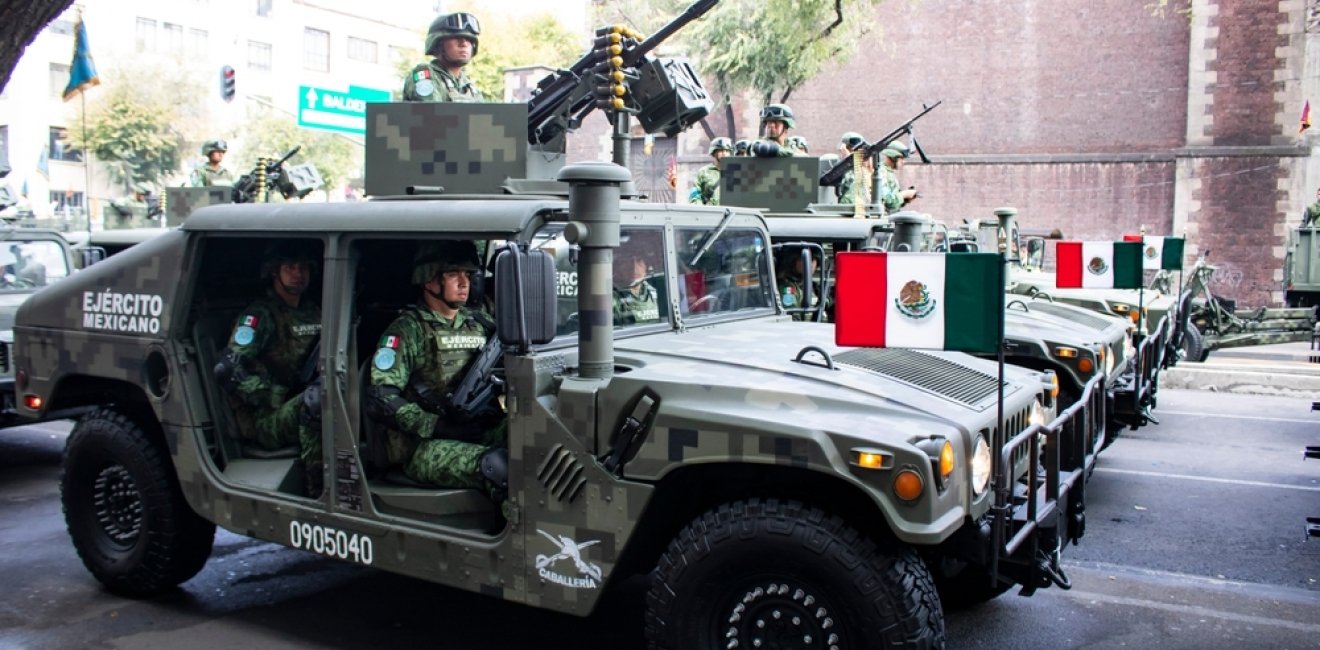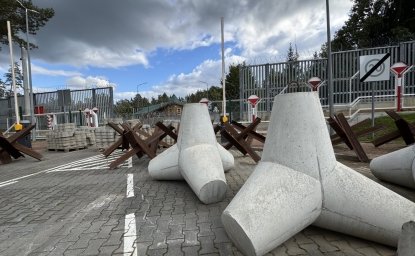
Mexico's public security has been progressively moving towards militarization for at least eighteen years. The army's participation, previously reserved for war and exceptional junctures, has normalized. Andrés Manuel López Obrador’s presidential term has been the latest development in this ongoing process and threatens to tip the scales towards an already unbalanced civil-military relationship.
Throughout Mexican history, the armed forces have taken on various roles in serving the state, but their modern involvement in public security is usually traced down to former president Felipe Calderón (2006-2012) and the so-called “war on drugs”. In his six-year term, Calderón massively deployed the military in Mexican territory without a constitutional framework, and the decision was appalling for security and human rights. Homicide figures tripled in his presidential term, lethality rates in fire-on-fire conflicts increased, and human rights complaints rose as military involvement in civil security responsibilities expanded1. Unsurprisingly, the military deployment raised both human rights and constitutional concerns.
Article 129 of the Mexican Constitution clearly states that “during peacetime, no military authority may perform any functions other than those directly related to army training”. However, a 1996 Supreme Court ruling softened this prohibition. In a landmark (and controversial)2 decision, the Justices argued that the military prohibition clause was not as absolute as the text suggested. The Court interpreted that the armed forces may act in peacetime if required or authorized by civilian authorities.3
With this case, the Court opened a window for the lawful involvement of military officials during ordinary times, but it also imposed restrictions, stating that any engagement must be explicitly mandated and under civilian control. Years later, the Inter-American Court of Human Rights in Alvarado Espinoza v. México added in this interpretation ruling that military involvement in Mexico should remain extraordinary and always subject to civilian oversight.4 Despite the constitutional and conventional safeguards placed on military involvement, the army's role in public security became normalized during the Calderón and Peña Nieto administrations, while civilian constraints were consistently bypassed.
As a political opponent, López Obrador denounced and rallied against the increasing militarization of public security. However, upon winning the presidency in 2018, he shifted course, making the armed forces his key allies. One of President López Obrador’s first constitutional changes was removing the federal police and replacing it with a new hybrid civil-military force deemed the “National Guard”5.
Under López Obrador's original proposal, the National Guard was intended to fall under the Ministry of National Defense (Sedena), but Congress and the opposition rejected that idea and handed the command of the new security organization to the Ministry of Public Security (SSPC). This was not merely a structural change; it responded both to human rights and constitutional standards that require public safety to be under civilian control.
The National Guard was, therefore, constitutionally designed as a civilian entity, under civilian control, but that vision rapidly decayed. The institutions’ hierarchical structure gradually incorporated military rules, its integration increasingly relied on military elements, and its formation embraced the armed forces' education, training, professionalization and promotion system. As if that were not enough, studies show that 8 out of 10 elements in the National Guard have a military background6. With military elements and military training, the National Guard has been widely regarded as a military institution cloaked in civilian guise.7
As military influence grew, López Obrador pushed to transfer full control of the National Guard to the Ministry of Defense (Sedena). In 2022, the president’s political party, Morena, approved legal amendments that transferred the control and operation of the National Guard to military hands. The political opposition challenged the legality of that change and in a hard-fought 8-3 decision, the Supreme Court ruled the legal amendment unconstitutional. At the heart of the Court's reasoning was the long-standing idea that public security should be under civilian, not military, control. 8
While the Court’s ruling represented a major setback to militarization, López Obrador doubled down on his efforts to place security institutions in the army’s domain. Following Morena’s landslide victory in the electoral race of 2024, the ruling party now holds the necessary majority in the Lower House and is one vote short in the Senate of being able to amend the Constitution. One of the top-priorities in the Congress is to fulfill Obrador’s agenda and give full control of the National Guard to the Minister of Defense (Sedena). If Morena manages to place civil security institutions under military control it will mark a new (fatal) milestone on a seemingly irreversible path.
Daniel Torres Checa. Attorney at Law specialized in constitutional and human rights litigation. He has been involved in different trials involving militarization matters before the Supreme Court and Federal Courts.
References
- INEGI, 2019. Nota Tecnica Homicidios a nivel nacional, Ciudad de Mexico: INEGI; Silva Forné, C., Pérez Correa, C. & Cano , I., 2019. Monitor del uso de la fuerza letal en America Latina. Monitor Fuerza Letal , pp. 96-132
- Juanes Laviada, R. & Torres Checa, Daniel, 2023. La militarización indómita: nuestra seguridad pública a juicio. Available at: https://eljuegodelacorte.nexos.com.mx/la-militarizacion-indomita-nuestra-seguridad-publica-a-juicio/
- SCJN (1996) Accion de Inconstitucionalidad 1/96;
- Torres Checa, Daniel, (2020) Breve historia militar, Centro de Estudios Constitucionales Suprema Corte de Justicia de la Nación, (CEC).
- Treviño Rangel, et al., 2021. Deadly force and denial: the military's legacy in Mexico's 'war on drugs'. The international Journal of Human Rights, 26(4), pp. 567-590
- Giles Navarro, A., 2023. Elementos para la evaluación de la Guardia Nacional", Ciudad de México : Instituto Belisario Dominguez.
- International Crisis Group, 2024. The General's Labyrinth: Crime and the Military in Mexico. Latin America Report, Issue 106, pp. 1-44.
- SCJN (2023) Accion de Inconstitucionalidad 137/2022.
Author

Explore More
Browse Insights & Analysis
WILSON CENTER ANNOUNCES NEW COMPETITION FOR 2026-2027 RESEARCH FELLOWS

On the Border of War
